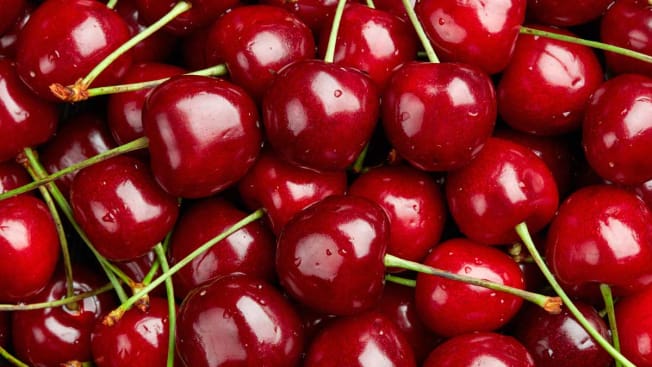This classic summer fruit could help control inflammation

By Sally Wadyka
It’s cherry season, and cherry growers expect to have a bumper crop this year. That’s a good thing because cherry nutrition power is plentiful and cherries have tons of health benefits. Plus, they’re delicious.
There are two types of cherries: sweet and tart (also called sour). The sweet ones (the most common variety is Bing) typically have dark red skin and are best eaten raw. Tart cherries (such as Montmorency) are sometimes sold fresh and can be eaten raw but are more frequently found dried, pressed into juice, or frozen or canned for use as cherry pie filling.
Both sweet and tart cherries have potential health benefits. Cherries, tart cherry juice, and cherry supplements have been linked to improvements in arthritis pain, gout, blood pressure, muscle soreness, and sleep. But can cherries really do all that? We looked at the latest science.
Cherry Nutrition
A cup of sweet cherries gives you 3 grams of fiber, about 10 percent of the daily value for vitamin C, and 6 percent of the daily value for potassium. A cup of tart cherries has roughly the same amount of fiber and potassium, and supplies 16 percent of the daily value for vitamin C.
But the real key to cherries’ health benefits lies in their antioxidant content. Sweet and tart cherries each contain high amounts of polyphenols—a category of antioxidants that includes anthocyanins, hydroxycinnamic acid, and flavanols, which are found in cherries.
“Anthocyanins seem to be the most active antioxidant and anti-inflammatory compound in cherries,” says Darshan Kelley, PhD, a nutrition research chemist at the Department of Agriculture Agricultural Research Service. These properties may help decrease the risk and severity of inflammatory diseases—such as arthritis, gout, diabetes, heart disease, and other chronic conditions.
Anthocyanins are also the compound that gives the fruit its deep, red color. “This antioxidant is not unique to cherries—they are also plentiful in strawberries, blueberries, and red grapes,” says Giuliana Noratto, PhD, an associate research scientist in the department of nutrition and food science at Texas A&M University in College Station. “But the amounts and proportions of anthocyanins and other antioxidants that cherries contain are unique.”
Because the exact polyphenol composition of every fruit is different, no two will have the exact same effects on the body. Even the two types of cherries contain different compositions of antioxidants. The concentration of total polyphenols is 30 percent higher in tart cherries, while sweet cherries contain 300 percent more anthocyanins, according to Kelley.
Benefits of Sweet Cherries
Thanks to their inflammation-fighting anthocyanins, much of the research involving sweet cherries has looked at their potential impact on chronic inflammatory diseases.
In studies that have shown benefits of cherries, the possibilities are promising. An early study by Kelley and colleagues at the USDA, published in the Journal of Nutrition, found that a daily dose of 45 sweet cherries reduced levels of C-reactive protein (an inflammatory marker) in the blood by 25 percent after 28 days. Levels remained lower when checked again 28 days after stopping cherry intake. And Noratto has conducted several in vitro studies, using cells in a lab rather than human subjects, that saw decreases in breast cancer tumor growth when the tissue was treated with anthocyanins extracted from sweet cherries.
Benefits of Tart Cherries
Much of the hype around the health benefits of tart cherries involves their purported abilities to speed post-exercise muscle recovery and help you sleep better.
After a hard bout of exercise, your muscles experience cell damage (also called oxidative stress) and may ache while they recover. Some studies have found that supplementing with tart cherries—usually in the form of juice or powder— reduces oxidative stress and inflammation, which helps speed healing and reduce muscle soreness. A 2021 study, published in the Journal of the International Society of Sports Nutrition, looked at the effect of taking 500 mg of tart cherry extract on post-exercise recovery. They found that the group taking the supplement before a strength training workout had lower markers of oxidative stress in their blood as well as less evidence of muscle damage later on.
Tart cherry juice’s claim as a sleep aid is typically based on the fact that the fruit contains melatonin, and several small studies have found that tart cherry supplementation can help people stay asleep longer. But cherries actually contain very little of the sleep-inducing hormone. A third of a cup of cherries has just 0.135 microgram of melatonin—and the dose typically recommended for sleep is much higher (1 to 5 mg). Some researchers theorize that other compounds in tart cherries—such as certain antioxidants or tryptophan—may contribute to any possible sleep benefits.
The Bottom Line on the Health Benefits of Cherries
Overall, studies on the health benefits of both sweet and tart cherries have shown mixed results. Most have included a small number of participants over a short duration. It’s also worth noting that several studies showing positive outcomes received funding from organizations related to cherry growing or marketing. The amount of cherries or cherry compounds used varies widely among studies—in some cases, up to the equivalent of several hundred cherries per day.
“The best evidence to date is related to cherries’ effects on decreasing oxidative stress, inflammation, and muscle soreness,” says Kelley, who co-authored a 2018 review of 29 studies on the health benefits of cherries. But as with any so-called superfood, cherries aren’t a magic bullet for your health. If you like cherries, feel free to indulge in fresh ones while they’re in season. And when they’re not, snacking on dried tart cherries, or having a small glass of cherry juice every day, probably can’t hurt (as long as you watch the added sugar content). You’ll be getting some essential nutrients and a good dose of antioxidants. And if those cherries also happen to reduce your muscle soreness after spin class, relieve some arthritis pain, or help prevent inflammation that can lead to other diseases, consider it a bonus.
Beware of cherry supplements and powders, however. When researchers use them in studies, the ingredients and antioxidant levels are highly controlled and carefully formulated. But buying them in the store or online, there’s no guarantee you’re getting exactly what you pay for.
The season is short, so fill up on fresh cherries while you can. To enjoy cherries year-round, Kelley suggests pitting and freezing cherries. Spread pitted cherries on a baking sheet and put them in the freezer, so they freeze individually. That way they won’t stick together when you put them in a container for longer storage. And consider opting for organic cherries if you can. Conventional cherries were one of the fruits and vegetables with a higher risk of pesticide exposure in Consumer Reports’ analysis of five years of USDA data on pesticides in produce.
Consumer Reports is an independent, nonprofit organization that works side by side with consumers to create a fairer, safer, and healthier world. CR does not endorse products or services, and does not accept advertising. Copyright © 2023, Consumer Reports, Inc.
This content was originally published here.




















